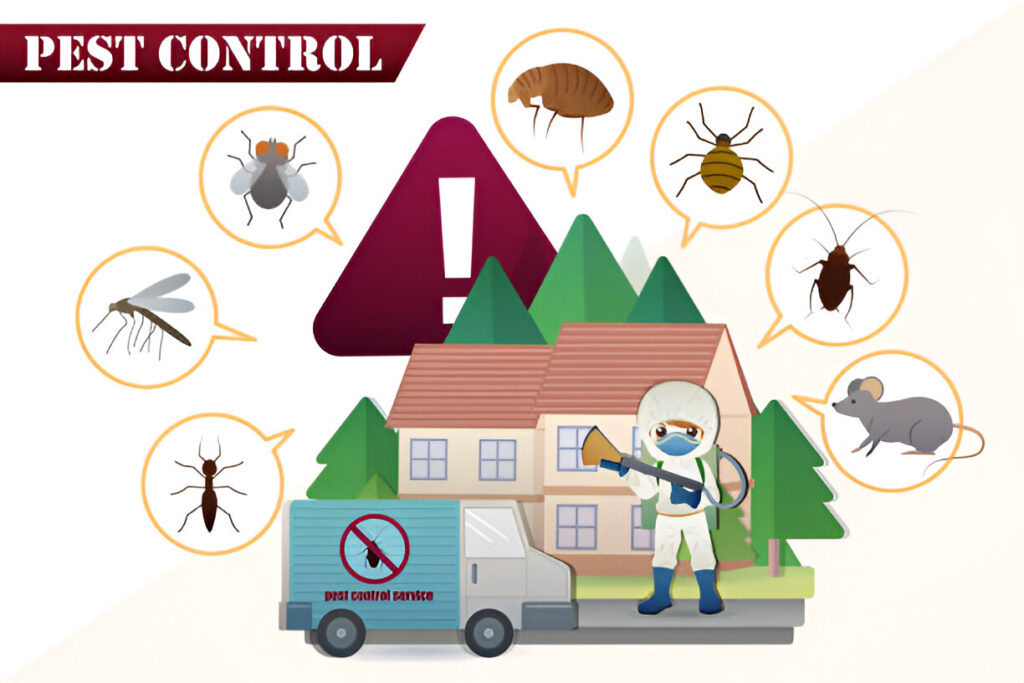Pest control is essential to maintaining a healthy, safe living environment. From ants and termites to mice and spiders, unwanted pests can cause serious damage to your home and transmit various diseases. Effective pest control strategies can save you time, money, and hassle.
Common Household Pests and Their Impacts
Households can face various pest infestations, each with unique challenges and potential damage. Here’s a look at some common pests and their impacts on homes:
- Ants: These tiny pests can invade kitchens, bathrooms, and garden spaces. They contaminate food and can damage wooden structures in severe cases.
- Termites: Termites feed on wood and are often undetected until significant damage is done. They compromise buildings’ structural integrity.
- Rodents: Mice and rats can carry diseases and cause damage to electrical wiring, insulation, and food supplies.
- Spiders: While most are harmless, some can have painful or dangerous bites. Their webs can also create an unkempt appearance.
- Bed Bugs: These pests bite and cause skin irritation. Once an infestation begins, they are notoriously difficult to eliminate.
Preventive Measures for Pest Control
Effective pest control begins with preventive measures. By making your home less attractive to pests, you can reduce the likelihood of infestations. Here are some strategies:
- Seal Cracks and Openings: Pests often enter homes through small cracks in walls, windows, and doors. Sealing these entry points can be a strong first line of defense.
- Maintain Cleanliness: Regularly cleaning, especially in the kitchen and dining areas, can reduce food attractants that draw pests indoors.
- Proper Waste Management: Ensure trash bins are closed and emptied regularly. Store food waste in secure bins to avoid attracting pests.
- Remove Standing Water: Water attracts pests like mosquitoes and rodents. Fix leaks and maintain proper drainage around your property.
- Trim Vegetation: Overgrown plants near your home provide hiding spots for pests. Regular trimming can keep your home less accessible to unwanted visitors.
Natural Pest Control Solutions
Many people prefer natural solutions for managing pests. These methods are often safer for humans, pets, and the environment:
- Essential Oils: Oils like peppermint, eucalyptus, and tea tree can repel various pests. Spraying these oils around the house may help prevent infestations.
- Diatomaceous Earth: This powder is effective against insects with exoskeletons, such as ants and bed bugs. Sprinkle lightly around infested areas for control.
- Beneficial Nematodes: These microscopic organisms can combat garden pests like grubs and termites.
- Herbs and Spices: Using herbs like basil or spices like cinnamon can serve as deterrents for certain pests.
Chemical Pest Control Options
Sometimes, natural methods might not suffice, and the use of chemical pest control becomes necessary. When using chemicals, it is critical to follow safety guidelines to avoid harm:
- Insecticides: These chemicals are designed to kill insects. Apply around the perimeter of your home or directly to infestations. Be cautious to follow the label instructions.
- Rodenticides: Designed to eliminate rodents, these products must be used very carefully, considering the possibility of accidental ingestion by pets or children.
- Foggers and Sprays: Useful for large infestations, these can be used to treat entire rooms. Vacate the area for the recommended time after application.
- Baits and Traps: These use attractants mixed with a toxicant. Strategic placement is essential for maximum effectiveness.
Professional Pest Control Services
For severe infestations or when self-treatment methods fail, professional pest control services offer expertise and advanced solutions. Companies in urban areas may have specialized strategies tailored to common pest problems. For instance, services working with pest control Las Vegas practitioners provide targeted approaches to local pest challenges, using regional knowledge to better manage infestations.
Benefits of Hiring Professional Services
- Expertise and Experience: Professionals have a depth of knowledge about pest behaviors and the most effective treatment methods.
- Customized Solutions: Treatments can be tailored to your specific pest situation and environment.
- Safety Assurance: Professionals know how to handle chemicals safely, reducing health risks to your family and pets.
- Long-term Prevention: Many services offer ongoing treatments to ensure pests remain out of your home over time.
Factors to Consider When Choosing Pest Control Services
Selecting a pest control service requires careful consideration. Here’s what to keep in mind:
- Licensing and Certifications: Ensure the company is licensed and certified to handle pest control tasks.
- Reputation and Reviews: Check online reviews and seek recommendations to gauge the effectiveness and customer service of potential providers.
- Service Guarantees: Some companies offer guarantees, providing follow-up treatments if pests return.
- Transparency: Look for services that explain treatment plans clearly and answer all your questions.
Wrapping Up: Maintaining a Pest-Free Home
Keeping your home free from pests is an ongoing process. Start with preventive measures, consider natural pest solutions, and use chemical treatments as necessary. Professional services can be a valuable ally in complex or persistent cases. A combination of these strategies ensures your home remains protected against the threats that pests pose. Remember, being proactive is the best defense against an infestation.

